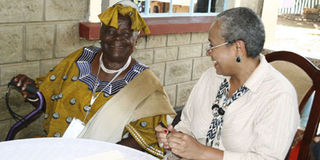OCHIENG : Rules that keep the English language on course can be quite mercurial

First Lady Margaret Kenyatta (right) talks with Mama Sarah Obama at her Nyang'oma Kogelo village home, on 28 November, 2013. Photo/JACOB OWITI
What you need to know:
- Yet, in our English-language newspapers and other publications, how frequently do I come across such adverbial unicorns as oftenly and outrightly?
- It was not statelily — but in a stately fashion — that Margaret Kenyatta carried herself the other day, when our First Lady capped her first of tour Luoland with a courtesy visit to Lady Sarah, the equally stately granny of Barack Hussein Obama
As I caution from time to time, the plethora of rules that keep the English language on course can be like quicksilver. For none stands on Ararat. To be quite sure, the rule requiring you to suffix an “ly” to an adjective to transform it into an adverb is solid. However, it is anything but watertight.
At least two pitfalls await you in that grammatical statute. The one is that many adverbs are etymologically independent and have no adjectival roots.
Such adverbs, therefore, do not have any ly ending. To add an ly to words like often, seldom and outright is to adverbise those words twice over.
Yet, in our English-language newspapers and other publications, how frequently do I come across such adverbial unicorns as oftenly and outrightly?
In the last issue of the Sunday Nation, a sub-editor put the following unlikely words in Prof Ali Mazrui’s mouth: “…President (Idi Amin) was predictable, but one could not outrightly say ‘No’ to him.”
I say unlikely because, although, on many social issues, I disagree with the great Kenyan political scholar, I can report that his mastery of English is way above average.
The Mazrui I often communicated with when he taught at Kampala’s Makerere University is unlikely to be unaware that, although it is basically an adjective, the word outright also serves as an adverb.
Outrightly is a manifestation of the illiteracy common in East Africa’s media.
That brings us to the second pitfall. It is that, although ly is what identifies most English adverbs, many adjectives also have an ly ending. They include costly (expensive), curmudgeonly (bad-tempered), dastardly (lily-livered) and stately (dignified).
HIDEOUS AND CUMBERSOME
These, I reiterate, are not adverbs but adjectives. Therefore, if anybody constrains you to “adverbise” them in the ordinary way, you have to double the “ly” ending and say: costlily, curmudgeonlily, dastardlily and statelily. But I must stress again and again that these latter formations do not exist in English.
And, as you can see for yourself, they are hideous and cumbersome.
That is why, even if they existed, I would strongly advise against them. And, as any sensible language would do, English turns the adjectives costly, curmudgeonly, dastardly, stately and others into adverbs, not by adding another ly to them, but by putting them in quite another grammatical context.
To “adverbise” the adjective costly, for instance, one has to place it (unchanged) in a longer construction and say, for example, in a costly manner —in which costly remains the adjective (describing the noun manner). It was not costlily — but in costly spending — that you bought your Peermohammed suit the other day.
Likewise, it was not statelily — but in a stately fashion — that Margaret Kenyatta carried herself the other day when our First Lady capped her first of tour Luoland with a courtesy visit to Lady Sarah, the equally stately granny of Barack Hussein Obama, who — like the far-off Pelasgic Zeus of Dodona once upon a time — rules with stateliness a whole sea away from his Nilotic home.





